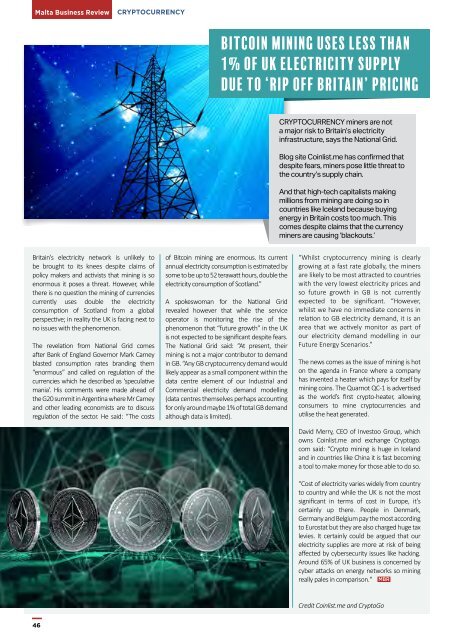MBR_ISSUE 40_Lowres
You also want an ePaper? Increase the reach of your titles
YUMPU automatically turns print PDFs into web optimized ePapers that Google loves.
Malta Business Review<br />
CRYPTOCURRENCY<br />
Bitcoin mining uses less than<br />
1% of UK electricity supply<br />
due to ‘Rip Off Britain’ pricing<br />
CRYPTOCURRENCY miners are not<br />
a major risk to Britain’s electricity<br />
infrastructure, says the National Grid.<br />
Blog site Coinlist.me has confirmed that<br />
despite fears, miners pose little threat to<br />
the country’s supply chain.<br />
And that high-tech capitalists making<br />
millions from mining are doing so in<br />
countries like Iceland because buying<br />
energy in Britain costs too much. This<br />
comes despite claims that the currency<br />
miners are causing ‘blackouts.’<br />
Britain’s electricity network is unlikely to<br />
be brought to its knees despite claims of<br />
policy makers and activists that mining is so<br />
enormous it poses a threat. However, while<br />
there is no question the mining of currencies<br />
currently uses double the electricity<br />
consumption of Scotland from a global<br />
perspective; in reality the UK is facing next to<br />
no issues with the phenomenon.<br />
The revelation from National Grid comes<br />
after Bank of England Governor Mark Carney<br />
blasted consumption rates branding them<br />
“enormous” and called on regulation of the<br />
currencies which he described as ‘speculative<br />
mania’. His comments were made ahead of<br />
the G20 summit in Argentina where Mr Carney<br />
and other leading economists are to discuss<br />
regulation of the sector. He said: “The costs<br />
of Bitcoin mining are enormous. Its current<br />
annual electricity consumption is estimated by<br />
some to be up to 52 terawatt hours, double the<br />
electricity consumption of Scotland.”<br />
A spokeswoman for the National Grid<br />
revealed however that while the service<br />
operator is monitoring the rise of the<br />
phenomenon that “future growth” in the UK<br />
is not expected to be significant despite fears.<br />
The National Grid said: “At present, their<br />
mining is not a major contributor to demand<br />
in GB. “Any GB cryptocurrency demand would<br />
likely appear as a small component within the<br />
data centre element of our Industrial and<br />
Commercial electricity demand modelling<br />
(data centres themselves perhaps accounting<br />
for only around maybe 1% of total GB demand<br />
although data is limited).<br />
“Whilst cryptocurrency mining is clearly<br />
growing at a fast rate globally, the miners<br />
are likely to be most attracted to countries<br />
with the very lowest electricity prices and<br />
so future growth in GB is not currently<br />
expected to be significant. “However,<br />
whilst we have no immediate concerns in<br />
relation to GB electricity demand, it is an<br />
area that we actively monitor as part of<br />
our electricity demand modelling in our<br />
Future Energy Scenarios.”<br />
The news comes as the issue of mining is hot<br />
on the agenda in France where a company<br />
has invented a heater which pays for itself by<br />
mining coins. The Quarnot QC-1 is advertised<br />
as the world’s first crypto-heater, allowing<br />
consumers to mine cryptocurrencies and<br />
utilise the heat generated.<br />
David Merry, CEO of Investoo Group, which<br />
owns Coinlist.me and exchange Cryptogo.<br />
com said: “Crypto mining is huge in Iceland<br />
and in countries like China it is fast becoming<br />
a tool to make money for those able to do so.<br />
“Cost of electricity varies widely from country<br />
to country and while the UK is not the most<br />
significant in terms of cost in Europe, it’s<br />
certainly up there. People in Denmark,<br />
Germany and Belgium pay the most according<br />
to Eurostat but they are also charged huge tax<br />
levies. It certainly could be argued that our<br />
electricity supplies are more at risk of being<br />
affected by cybersecurity issues like hacking.<br />
Around 65% of UK business is concerned by<br />
cyber attacks on energy networks so mining<br />
really pales in comparison." <strong>MBR</strong><br />
Credit Coinlist.me and CryptoGo<br />
46

















